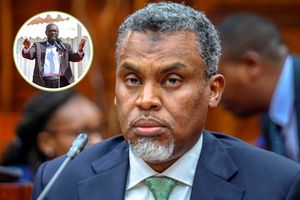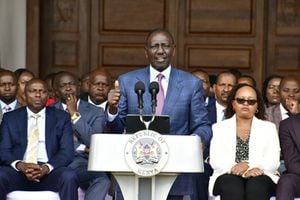Police brutality against protests courting anarchy
What you need to know:
- The citizens’ right to picket or stage protests or demonstrations is guaranteed by the Constitution.
- Police officers who rounded up journalists for simply covering the protests have a case to answer.
The use of brute force by police to disperse peaceful protesters in Nairobi’s city centre on Tuesday, in which scores were arrested, is a shameful violation of their cardinal rights. The citizens’ right to picket or stage protests or demonstrations is guaranteed by the Constitution.
It is, therefore, totally unacceptable that some peaceful demonstrators were arrested and assaulted by the officers, and others, including journalists, who were doing their rightful work, also injured.
The police officers who rounded up journalists for simply covering the protests have a case to answer, as these reporters were only carrying out their professional responsibility.
Innocent law-abiding people have been subjected to suffering and pain for exercising their freedom of expression by opposing the Finance Bill, 2024, which contains what critics have denounced as “oppressive and punitive” tax proposals.
Indeed, the senior officers who authorised and let their juniors go into the streets to hurl teargas at and arrest the demonstrators are guilty of denying the people their freedom of movement and expression.
The police action amounts to courting anarchy and disaster in a country that has distinguished itself as a most civilised and vibrant democracy in the East African region and the entire continent.
This is a blatant erosion of the gains in civil rights that the people have been enjoying since the promulgation of the 2010 Constitution. The police are, in fact, expected to protect demonstrators as long as their march is peaceful and watch over them as they go and present their petitions.
Dangerous culture
The negation of this is an affront on the cardinal principles of the rights that the people waged for a long time, culminating in the implementation of the Constitution. A dangerous culture is developing in the country, where practically every protest is treated by the police as an illegal activity.
They have absolutely no right to determine where and when a demonstration should be held.
Article 37 of the Constitution of Kenya protects cardinal freedoms. Therefore, the supreme law of the land guarantees the freedom to assemble, which police must respect.
The brief of the law enforcement officers is to be on the lookout and only intervene if such a protest degenerates into a criminal activity.
When the protesters took to the streets in the central business district to convey their stand to Parliament on the controversial Finance Bill that was tabled by the Finance and Planning Committee, they only carried placards.
They did not pose any security threat and should, therefore, have been allowed to reach their destination and present their petitions.
Inspector-General of Police Japhet Koome and his officers in charge of the capital city have a case to answer for the strong-arm tactics deployed against very peaceful demonstrators, using teargas and water cannon.
The police showed utter disrespect for fellow law-abiding Kenyans, whose only sin in their eyes is to oppose the proposed high taxes.
Political Canaan
The arrogance and high-handedness was further displayed in the harassment of lawyers at the Central Police Station, as they went to enquire about some of the people arrested. The police have no right to prevent lawyers from accessing suspects and eventually represent them in court.
It is not enough that some of the people arrested by the people were later set free unconditionally. They should not have been arrested, in the first place.
When the 2010 Constitution was promulgated, many Kenyans thought they had reached political Canaan, where the freedoms and rights of the citizens are not just guaranteed in the statutes, but also highly respected by the authorities.
All the people are required to do is to inform the police about their plan to hold a demonstration. Now, they are being blocked from even exercising their very constitutional right to stage peaceful protests. It is now evident that the past repression the people fought for hard against could be creeping back.
The police must respect the citizens’ constitutional right to protest and instead concentrate on maintaining security for all.
Of course, it is important that such protests remain peaceful but the police cannot arrogate to themselves the power to arbitrarily take away constitutionally guaranteed rights. It should never happen and must be condemned in the strongest terms possible.





